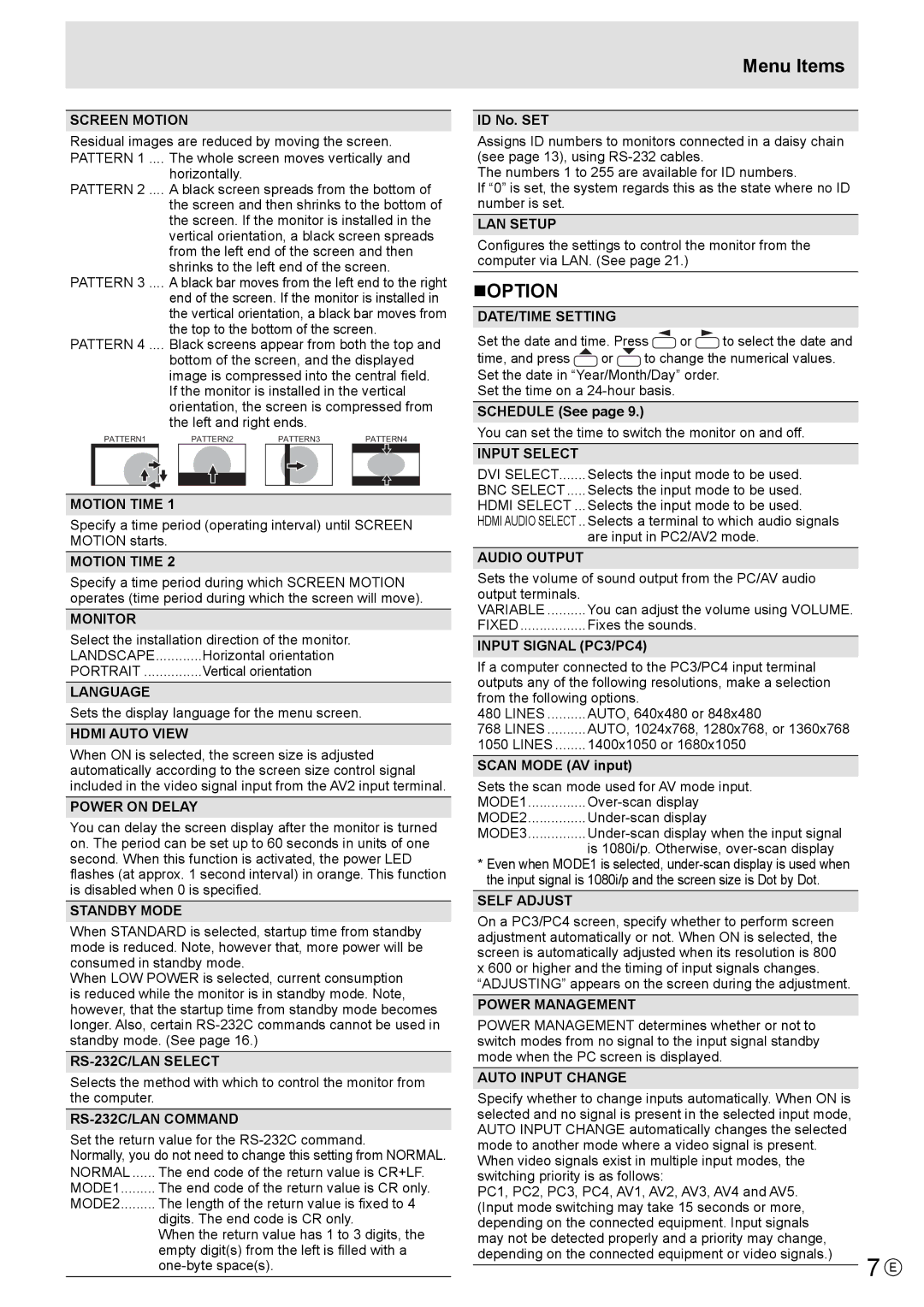
SCREEN MOTION
Residual images are reduced by moving the screen.
PATTERN 1 | .... The whole screen moves vertically and |
| horizontally. |
PATTERN 2 | .... A black screen spreads from the bottom of |
| the screen and then shrinks to the bottom of |
| the screen. If the monitor is installed in the |
| vertical orientation, a black screen spreads |
| from the left end of the screen and then |
| shrinks to the left end of the screen. |
PATTERN 3 | .... A black bar moves from the left end to the right |
| end of the screen. If the monitor is installed in |
| the vertical orientation, a black bar moves from |
| the top to the bottom of the screen. |
PATTERN 4 | .... Black screens appear from both the top and |
| bottom of the screen, and the displayed |
| image is compressed into the central field. |
| If the monitor is installed in the vertical |
| orientation, the screen is compressed from |
| the left and right ends. |
PATTERN1 | PATTERN2 | PATTERN3 | PATTERN4 |
MOTION TIME 1
Specify a time period (operating interval) until SCREEN MOTION starts.
MOTION TIME 2
Specify a time period during which SCREEN MOTION operates (time period during which the screen will move).
MONITOR
Select the installation direction of the monitor.
LANDSCAPE | Horizontal orientation |
PORTRAIT | Vertical orientation |
LANGUAGE
Sets the display language for the menu screen.
HDMI AUTO VIEW
When ON is selected, the screen size is adjusted automatically according to the screen size control signal included in the video signal input from the AV2 input terminal.
POWER ON DELAY
You can delay the screen display after the monitor is turned on. The period can be set up to 60 seconds in units of one second. When this function is activated, the power LED flashes (at approx. 1 second interval) in orange. This function is disabled when 0 is specified.
STANDBY MODE
When STANDARD is selected, startup time from standby mode is reduced. Note, however that, more power will be consumed in standby mode.
When LOW POWER is selected, current consumption is reduced while the monitor is in standby mode. Note, however, that the startup time from standby mode becomes longer. Also, certain
Selects the method with which to control the monitor from the computer.
RS-232C/LAN COMMAND
Set the return value for the
Normally, you do not need to change this setting from NORMAL.
NORMAL | The end code of the return value is CR+LF. |
MODE1 | The end code of the return value is CR only. |
MODE2 | The length of the return value is fixed to 4 |
| digits. The end code is CR only. |
| When the return value has 1 to 3 digits, the |
| empty digit(s) from the left is filled with a |
| |
|
|
Menu Items
ID No. SET
Assigns ID numbers to monitors connected in a daisy chain (see page 13), using
The numbers 1 to 255 are available for ID numbers.
If “0” is set, the system regards this as the state where no ID number is set.
LAN SETUP
Configures the settings to control the monitor from the computer via LAN. (See page 21.)
OPTION
DATE/TIME SETTING
Set the date and time. Press ![]() or
or ![]() to select the date and
to select the date and
time, and press or to change the numerical values.
Set the date in “Year/Month/Day” order. Set the time on a
SCHEDULE (See page 9.)
You can set the time to switch the monitor on and off.
INPUT SELECT |
|
DVI SELECT | Selects the input mode to be used. |
BNC SELECT | Selects the input mode to be used. |
HDMI SELECT ... | Selects the input mode to be used. |
HDMI AUDIO SELECT .. | Selects a terminal to which audio signals |
| are input in PC2/AV2 mode. |
|
|
AUDIO OUTPUT |
|
Sets the volume of sound output from the PC/AV audio | |
output terminals. |
|
VARIABLE | You can adjust the volume using VOLUME. |
FIXED | Fixes the sounds. |
INPUT SIGNAL (PC3/PC4)
If a computer connected to the PC3/PC4 input terminal outputs any of the following resolutions, make a selection from the following options.
480 LINES | AUTO, 640x480 or 848x480 |
768 LINES | AUTO, 1024x768, 1280x768, or 1360x768 |
1050 LINES | 1400x1050 or 1680x1050 |
| |
SCAN MODE (AV input) | |
Sets the scan mode used for AV mode input. | |
MODE1 | |
MODE2 | |
MODE3 | |
| is 1080i/p. Otherwise, |
*Even when MODE1 is selected,
SELF ADJUST
On a PC3/PC4 screen, specify whether to perform screen adjustment automatically or not. When ON is selected, the screen is automatically adjusted when its resolution is 800 x 600 or higher and the timing of input signals changes.
“ADJUSTING” appears on the screen during the adjustment.
POWER MANAGEMENT
POWER MANAGEMENT determines whether or not to switch modes from no signal to the input signal standby mode when the PC screen is displayed.
AUTO INPUT CHANGE
Specify whether to change inputs automatically. When ON is selected and no signal is present in the selected input mode, AUTO INPUT CHANGE automatically changes the selected mode to another mode where a video signal is present.
When video signals exist in multiple input modes, the switching priority is as follows:
PC1, PC2, PC3, PC4, AV1, AV2, AV3, AV4 and AV5. (Input mode switching may take 15 seconds or more, depending on the connected equipment. Input signals may not be detected properly and a priority may change, depending on the connected equipment or video signals.)
7 E
